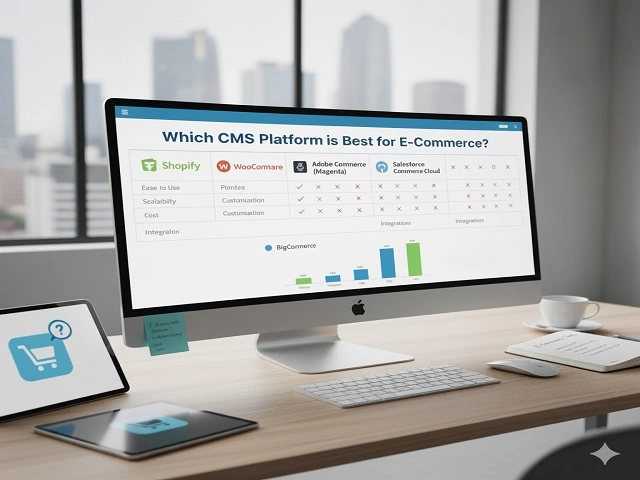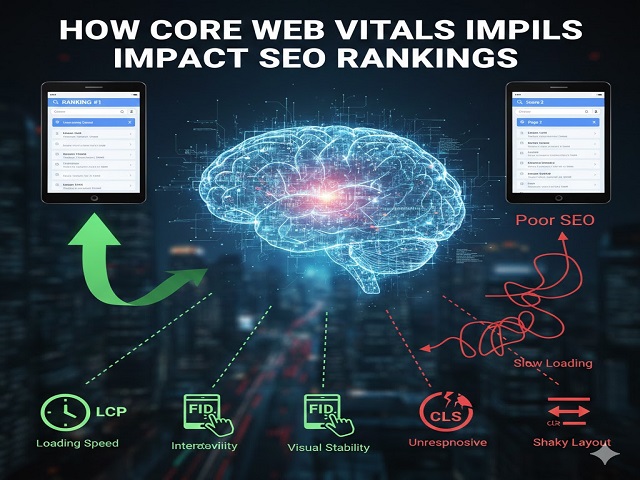Choosing the right platform is one of the most important things for every business entering the digital marketplace. A robust base ensures that things run smoothly and can grow over time. A Content Management System (CMS) is the backbone of online retailing. It guides a
As more and more businesses go digital first, it’s becoming more and more crucial to know which CMS is best for e-commerce. A good CMS does more than merely store things. It makes things easier for users, makes management easier, and makes the brand more visible. There are many platforms to choose from, but the hard part is finding one that is flexible, performs well, and is affordable.
The role of a CMS in online retail
A CMS lets businesses change how their online store looks, works, and is set up. It keeps track of product pages, customer information, and the procedures you need to take to complete an order. It also lets those who aren’t good with computers make modifications without having to learn how to code. This makes things easier, which saves time and money.
The best thing about a CMS is that it can be customised to fit your specific needs. As businesses grow, they may add third-party apps, track data, and offer additional services. An improper CMS can hinder growth, but the right one can unlock doors to long-term success.
Why Shopify stands out
Shopify for e-commerce has become a trusted choice among numerous platforms. It offers a good mix of features and ease of use, making it suitable for both new and established businesses. The platform features built-in hosting, secure payment channels, and customizable templates.
Its cloud-based structure is a big plus. Businesses don’t have to bother about servers or maintenance. Updates occur automatically, which keeps everything running smoothly. Businesses that want to provide their customers with a consistent experience every time require this level of reliability.
Flexibility through design and development
Shopify web development is vital today due to the need for customised solutions. These Shopify website development services enable businesses to create storefronts that align with their brand and operate smoothly.
A customised store is more than simply pretty. It makes it easier to get about, speeds up loading times, and makes the checkout process more efficient. All of these things make users happy, which in turn leads to more conversions. Businesses that pay for professional development don’t make the same mistakes as those that employ generic templates.
The value of a professional design partner
Businesses can make a unique and professional online presence by working with a Shopify website design company. These kinds of businesses know how to read market trends, understand human behaviour, and effectively employ visuals. They ensure the store looks good and functions properly.
Expert designers also ensure that mobile experiences are optimized to their best potential. Since a lot of online shopping is done on smartphones, websites need to be mobile-friendly. A store that works well on all devices makes people trust it and want to come back.
Importance of e-commerce SEO
Even the best-designed store won’t do well if people can’t see it. That is where an e-commerce SEO agency comes in. Search engine optimization ensures that those looking for products online can find the store.
Professional agencies offer e-commerce SEO services that focus on targeting the right keywords, making changes to the pages themselves, and improving the site’s technical aspects. These things help your website rank higher in search engines. More traffic and, ultimately, more purchases come from higher ranks. SEO is not only an option for organisations. It is a key strategy.
Shopify SEO advantages
One key advantage of using Shopify is that it integrates well with SEO. Businesses may use Shopify SEO optimization to make their sites more visible, speed up loading times, and lower bounce rates. You can modify the metadata, structure the URLs, and incorporate SEO tools into the platform.
Shopify stores can outperform their competitors on search engines when they utilise professional services. This mix of easy-to-use design and search-friendly features makes it one of the best platforms out there.
Developing an e-commerce website strategically
Developing an e-commerce website takes a lot of planning. When creating a website, businesses need to consider more than just its appearance. They also need to think about how easy it is to use, how safe it is, and how well it can grow. A well-planned site makes it easy for customers to navigate, which enhances their overall experience.
Integration with secure payment gateways, real-time delivery options, and efficient inventory management ensures a seamless operation. Cyber dangers can’t access the website if it receives regular updates and undergoes regular testing. Businesses that pay attention to these details tend to perform better and retain their customers for longer.
Evaluating other CMS options
Shopify is a well-known option, but it’s not the only one. WooCommerce, Magento, and BigCommerce are among the other platforms that offer distinct functionalities. If your firm already uses WordPress, WooCommerce is a great choice. Magento lets businesses with technical resources customise things in great detail. BigCommerce allows you to expand your product catalogue as needed.
However, these other options typically require more technical expertise and ongoing maintenance. Shopify remains the best solution for businesses seeking a simple, scalable, and reliable platform. It works really well, as it offers a good mix of easy-to-use tools and strong capabilities.
Long-term scalability and support
To be successful in e-commerce, you need to do more than just open a store. As demand grows, it needs to scale up its operations. Shopify’s ecosystem meets this requirement by providing apps, integrations, and payment alternatives from around the world.
Businesses can also rest assured knowing that they have dedicated assistance. The platform can handle a significant amount of traffic during holiday sales or when a business wants to expand into new markets without experiencing severe problems. This flexibility ensures that firms are well-prepared for the future.
Key considerations before choosing
Before choosing a CMS, every organisation must consider its goals. The choice should be based on budget, technical expertise, and growth objectives. For small to medium-sized organisations, ease of use and low cost are frequently more important than complex customisation.
For large businesses, being able to grow and integrate with other systems is crucial. Shopify’s extensive ecosystem enables it to meet both needs simultaneously. However, decision-makers must carefully weigh the pros and cons of features against their long-term objectives.
Choosing the right foundation is very vital for an internet business to do well. It’s not just a technical choice to choose which CMS is best for ecommerce. It is an investment that will help your business expand, get more exposure, and build trust with customers. Choosing the right platform and getting help from experts can help businesses succeed in the long run. The path to digital greatness is even stronger when you work with professionals like us at SAVIT.




